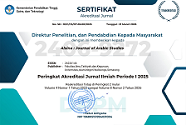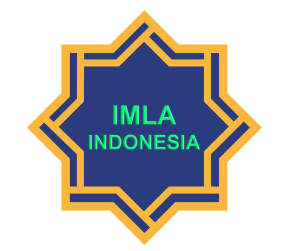Idārat Jūdat al-Ishrāf al-Lughawiy fi Tarqiyat Ta'līm al-Lughah al-‘Arabiyah bi Ma'had Jāmi‘ah Maulāna Mālik Ibrāhīm al-Islāmiyyah al-Ḥukūmiyyah Malang
DOI:
https://doi.org/10.21580/alsina.1.2.4503Keywords:
Quality Management, Language Guidance, Arabic Learning ImprovementAbstract
There is quality management with education subject who teach and guide college students in Arabic learning. Mushrifs is the santri’s companion in the first and second semester in Mahad Al-Jami’ah. In particular program, they teach Arabic in Mahad and conduct Arabic learning. The quality of Mushrifs of Language in improving Arabic learning is one of the objectives in order to generate good and success mushrifs in Mahad Al-Jami’ah. The research problems were: 1) How is the planning quality of language guidance in improving Arabic learning in mahad al-jami’ah, 2) how is the organization quality of language guidance in improving Arabic learning in mahad al-jami’ah, 3) how is the implementation of quality Supervision of language in improving the Arabic learning in mahad al-jami’ah, 4) how is the supervision quality of language guidance in improving Arabic learning in mahad al-jami’ah. This study aimed to describe the planning, organization, implementation, and supervision of quality management of mushrifs in improving the Arabic learning in Mahad Al-jam’ah. This study used descriptive analysis design, and the data collections were through observation, interview and documentation, and through all those things to research in data’s about the quality management of language guidance. The results of quality management of language guidance study in improving the Arabic learning were: 1) in the planning stage, the first process was opening the registration for mushrifs’ candidates with a very strict selection, 2) in the organization aspect was the cooperation relationship between the mahad director, murabbi, and mushrifs of language with their tasks, 3) in the implementation aspect was through PSDM, language enrichmen, shabah al-lugah, gebyar bahasa competition and bilingual seminar; 4) and in the supervision aspect was the supervision was conducted once in two weeks by murabbi of language.
Downloads
References
Abd al-Rahman Qindil, 1993.Yasin, al-Tadris wa i’dad al-mualimin Riyadh: Wizârah al-Nasyr al- Dauli
A Gani , 1987. Bustami, Al Arabiyah Bin-Namadzij, Jakarta: PT Bulan Bintang,
Arikunto, Suharsimi, 1998. Prosedur Penelitian, Suatu Pen-dekatan Praktek , Jakarta : PT. Rineka Cipta
Arcaro, Jerome, 2006 Pendidikan Berbasis Mutu Prinsip-Prinsip Perumusan dan Tata Langkah Penerapan, Yogyakarta: Pustaka Pelajar
Bahruddin, Uril. 2010. Tathwîr Manhaj Taʻlîm al-Lughah al-‘Arabiyyah (Malang: UIN Maulana Malik Ibrahim Ma-lang Press
Efendi Hariadja, 2002. Marihot, Manajemen Sumber Daya Manusia: Pengadaaan, pengembangan, pengkompen-sasian dan peningkatan produktifitas karyawan, Jakar-ta: PT Gramedia Widiasarana Indonesia
Fahmi, Irfan, 2011. Analisis Kinerja, Bandung: Alfabeta
Fakhrudin, Arif, 2007. Pengantar Penelitian dalam Pendidi-kan, Bandung : Pusataka Pelajar
Hasibun. Malayu, 2000. Manajemen Sumber Daya Manusia, Jakarta: Bumi Aksara,
Huberman A Miles, Mattew B. 1992. Analisa Data kualitatif: Buku Sumber tentang Metode-Metode Baru, Ter-jemahan Oleh Tjetjep Rohendi Rohidi, (Jakarta :Universitas Indonesia (UI) Press
Idrus, Muhammad, 2009. Metode Penelitian Ilmu Sosial Pendekatan Kualitatif dan Kuantitatif, Jakarta: Erlang-ga
Jones, James j, & Walters, Donald. 2008. Human Resource Manajement in Education. Sleman Yogyakarta: Q-Media
Minarti, Sri, 2011. Manajemen Sekolah, Yogyakarta : Ar-ruzz media
Marno. Dkk. 2008. Manajemen dan kepemimpinan pendidi-kan islam. Bandung: PT Rafika Aditama
Maujud, Izzat abdul. 1976. muallim allugah alarabiyah khurthum
Moleong, Lexi J, 2000. Metodologi Penelitian Kualitatif, (Bandung : PT. Remaja Rosdakarya
Mulyasa, E, 2005. Menjadi Kepala Sekolah Professional da-lam Mensukseskan MBS dan KBK, Bandung: PT. Remaja Rosdakarya
Nurjana, Nana, 2000. Dasar-dasar Proses Belajar Mengajar , Bandung : Sinar algesindo
Sallis, 1993. Total Quality Management In Education, Lon-don: Kogan Page Education Management Series
Siswanto, Bedjo, 1989. manajemen tenaga kerja ancangan dalam pendayagunakan dan pengembangan unsur tenaga kerja, Bandung: Sinar Biru
Sondang, Siagian. 2007. Fungsi –Fungsi Manajerial. jakarta: Bumi Aksara
Sugiono, 2011. Metode Penelitian Kualitatif, Kuantitatif dan R&D, (Bandung: Alfabeta
Syani, Abdul, 1987. Manajemen Organisasi surabaya: Bina Aksara
Usman ,Husaini, 2008. Manajemen Teori Praktik & Riset Pendidikan, Jakarta: Bumi Aksara
Zainuddin, Radliah, 2005. Pembelajaran Bahasa Arab, Ja-karta: Pustaka Rihlah Group
Hendayana, Sumar. Dkk. 2007. Lesson Study Suatu Strategi untuk Meningkatkan Keprofesionalan Pendidik – Pen-galaman IMSTEP-JICA. Bandung: UPI Press
Muhaiban. 2006. ‘Al-lughah al-‘Arabiyyah fi Indunisiya: Dirasah Ta’liliyyah ‘an Tatawwuratiha wa Musykilat Ta‘limiha’. Jurnal Studia Islamika UIN Sunan Kalijaga Yogyakarta
Khoirul Adib, Makalah disampaikan dalam Pelatihan Pen-ingkatan Keprofesionalan Guru Bhs Arab http://sastra.um.ac.id/?p=964 diakses tanggal 22 Nopember 2015
Alwanis, http://www.lakii.com/vb/a-88/a-124686/, diakses pada tanggal 13 januari 2016
www.gla.ac.uk/media/media_204791_en , diakses pada tanggal 3 April 2016
Downloads
Published
How to Cite
Issue
Section
License
Copyright
The copyright of the received article shall be assigned to the publisher of the journal. The intended copyright includes the right to publish the article in various forms (including reprints). The journal maintains the publishing rights to published articles. Authors are allowed to use their articles for any legal purposes deemed necessary without written permission from the journal, but with an acknowledgment to this journal of initial publication.
Licensing
In order for Alsina: Journal of Arabic Studies to publish and distribute research articles, the editors need publishing rights (transferred from author to publisher). This agreement relates to the transfer/publishing copyright license to Alsina: Journal of Arabic Studies but the authors still have significant rights to use and share their published articles.
Alsina: Journal of Arabic Studies supports the need for writers to share, disseminate and maximize the impact of their research and their rights on any database. As a journal article writer, you have the right to various uses of your articles, including that by the institution or company where you work. Copyright can be used without the need for special permission. Authors who publish articles in the Alsina: Journal of Arabic Studies have broad rights to use their work for teaching and scientific purposes without requesting permission, including:
- Use by the author for lectures, presentations, or conferences, with distribution of copies to participants;
- Distribution to colleagues for research use;
- Use in compilations of the author's subsequent work;
- inclusion in a thesis or dissertation;
- Reuse of sections or excerpts from articles in other works (with full acknowledgment of the final article);
- Preparation of derivative works (other than commercial purposes) (with full acknowledgment of the final article);
- Voluntary posting on open websites operated by authors’ or writers' agencies for scientific purposes
When submitting a manuscript, authors do so on the understanding that if accepted for publication, the copyright for publishing (publishing right) of the article shall be assigned/transferred to Alsina: Journal of Arabic Studies.
Authors whose articles are accepted for publication will receive confirmation via email and sent a Copyright Transfer Agreement.


 Accreditation
Accreditation 
 In Collaboration with
In Collaboration with 

 Visitors
Visitors  Article Template
Article Template





